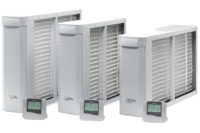Metalmark, a climate tech company developing air filtration products, recently announced the self-renewing Tatama Air Cleaner as a solution to the pressing issue of indoor air quality compromised by wildfires. Designed for commercial buildings, it removes harmful airborne particulates, smoke, and pathogens – per third-party independent testing with MS2 and Staphylococcus.
Wildfires emit a large number of submicron particles with varied toxic chemical compositions. Typical HVAC systems are not designed to address smoke pollution. Tatama addresses these emergency needs and also provides day-to-day protection against other air contaminants.
“Our mission as a team has been to develop an effective, sustainable, and low-maintenance air cleaner that provides superior indoor air quality. We started the process knowing ventilation was not enough; we took our R&D a step further and have been able to create a patented air cleaner unlike any other in the marketplace,” said Metalmark CEO Sissi Liu.
Specific to wildfire smoke, Tatama’s patented baseline technology was named a winner of the US EPAs Cleaner Indoor Air during Wildfires Challenge. Made with HEPA-grade filters that capture 99.97+% of particulate matter, including wildfire smoke without byproduct emissions, the technology was validated by the EPA’s testing. About once a month, the system cleans its filter to enable up to five years of useful life under normal conditions.
Tatama is a result of over seven years of R&D led by Metalmark co-founders and inventors, along with support from the National Science Foundation and others.
Ventilation during wildfire smoke events raises serious health concerns. Even with HVAC filtration systems fitted with MERV-13 filters, the majority of smoke particles escape removal. A scientifically peer-reviewed paper by Metalmark scientists reveals the gaps in HVAC filter technology and industry test standards.
Among the most concerning findings by Metalmark scientists:
- Wildfire smoke comprises vastly of particles below 0.3 microns in diameter, which is far smaller than generally believed. Particles in this size range can easily pass through tissues, enter the bloodstream, and trigger severe medical problems, such as cardiovascular and respiratory diseases, as well as leading to long-term threats such as dementia. They are also carriers of chemical pollutants, increasing the health dangers.
- The media of most HVAC MERV filters either don’t effectively capture such small particles, leaving people who are indoors exposed to the dangers of wildfire smoke, or are associated with high energy costs.
Tatama is a system that targets commercial building retrofits and new-build integrations. Owing to its patented self-renewing technology, it offers a low cost of ownership, maintenance, and waste generation while providing cleaner indoor air with a number of potential health and economic benefits such as reduced absenteeism and HVAC energy use.
In addition to the innovative design, Tatama provides real-time IAQ data insights and smart operations.







